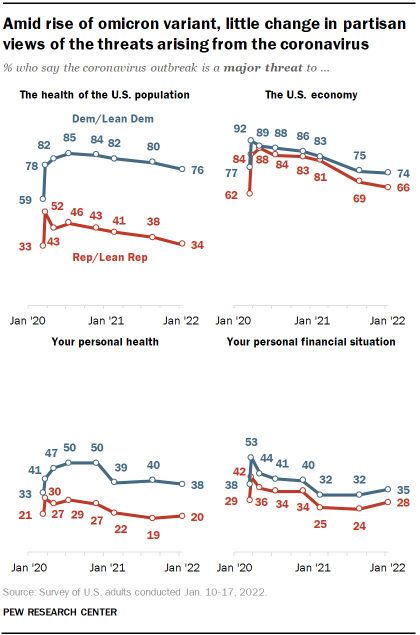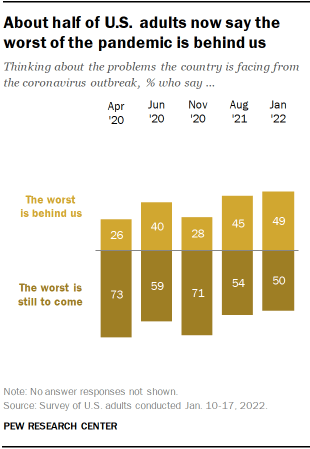The public’s views of the threat the coronavirus poses to the nation’s health and economy – and to individuals’ personal health and finances – have changed little in recent months amid the spread of the omicron variant throughout the United States.
Nearly seven-in-ten adults (69%) continue to say that the coronavirus outbreak is a major threat to the U.S. economy. A quarter say that is it a minor threat to the country’s economy, while just 5% say it is not a threat. The share who say the coronavirus is a major threat to the economy is little changed from August, when 72% called the outbreak a major threat.
A narrower majority of adults (57%) say that the coronavirus outbreak is a major threat to the health of the U.S. population as a whole; 35% say it is a minor threat and 8% say it is not a threat to the health of the population. These views also have changed only modestly since August, when 61% said the coronavirus outbreak was a major threat to the health of the population as a whole.
There continue to be wide partisan differences in views of the threat from the coronavirus to public health, though there are smaller differences in assessments of its impact on the economy and individuals’ health and finances.
Republicans and Democrats remain deeply divided in their views of the health threat posed by the pandemic. Democrats are more than twice as likely as Republicans to say the coronavirus is a major threat to the health of the population as a whole: 76% of Democrats and Democratic leaners say this, compared with 34% of Republicans and GOP leaners. The size of the partisan gap has remained fairly consistent over the past two years.
By contrast, majorities in both parties view the pandemic as a major threat to the country’s economy. About three-quarters (74%) of Democrats say the coronavirus outbreak is a major threat to the economy, as do 66% of Republicans.
Three-in-ten adults say the coronavirus outbreak is a major threat to their personal health, and a similar share of Americans (32%) say it is a major threat to their personal financial situation. Democrats are more likely than Republicans to say the pandemic is a major threat to their personal health (38% of Democrats say this, compared with 20% of Republicans). There also continue to be sizable differences in these views by race and ethnicity: 49% of Black adults say the coronavirus is a major threat to their personal health, compared with 41% of Hispanic adults, 30% of Asian Americans and about a quarter (24%) of White adults.
As in prior surveys, there are only modest partisan differences in views of the threat from the coronavirus to personal finances. Democrats are somewhat more likely than Republicans to say it is a major threat to their personal finances (35% of Democrats vs. 28% of Republicans). Hispanic (47%) and Black adults (46%) are more likely to say the coronavirus is a major threat to their personal finances than Asian (30%) or White adults (26%).
Public divided on whether the worst is over
About half of adults (49%) now say that the worst of the problems the country is facing from the coronavirus outbreak are behind us, compared with a nearly identical share (50%) who say the worst is still to come. In August 2021, a narrow majority (54%) said that the worst was still to come.
Republicans continue to express more optimistic views on this question than Democrats, though the partisan gap is smaller than at any previous point in the pandemic. A slim majority of Republicans (53%) and 47% of Democrats say that the worst is behind us. The share of Democrats who say the worst is behind us has increased by 7 percentage points since August, while the share of Republicans who say this is unchanged over the same time period.




